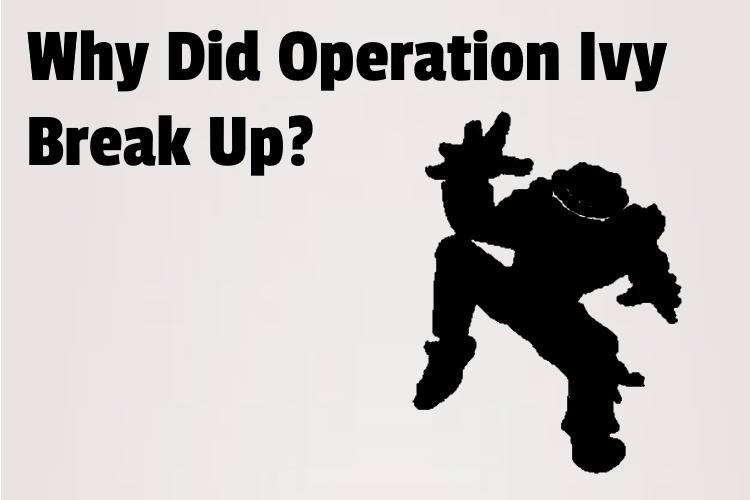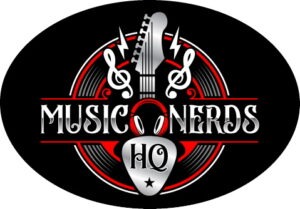
Fusing ska into a solid punk experience, Operation Ivy had an impact on the evolution of punk music that fans continue to discuss today. So if they were that groundbreaking, why did Operation Ivy break up?
Here’s what I know:
Operation Ivy broke up due to the pressures of being offered a major label record deal, singer Jesse Michaels getting tired of the grind, guitarist Tim Armstrong’s increasing alcohol consumption, and a general feeling that it just wasn’t as fun anymore as when they first started.
These guys played as a group for only two years,.
But more than 30 years later, their lone LP has sold more than half a million copies. It was reissued in 2007. Those of us who were lucky to get our hands on one of the original vinyl copies have a real piece of coveted punk memorabilia.
Back in 1988, Jesse Michaels, Tim Armstrong, Matt Freeman, and Dave Mello came dangerously close to the breakthrough fame that other bands in the East Bay punk scene would later enjoy.
Part of the original Gilman Street (a street in Berkeley near where I used to live) scene that gave birth to bands like Green Day and the Offspring, they quickly earned a cult following and launched to nationwide fame (ok, it was underground fame, but still…).
Right when they seemed unstoppable, they called it quits.
Back then, when the band announced they were breaking up, they gave no official explanation. We were all just left hanging in the disappointment of our expectations. There were a lot of rumors and speculation, but, in the end, the guys all remained tight-lipped. And they stayed that way for years.
In 2009, Tim Armstrong and Matt Freeman sat down with Lars Frederickson (from Rancid) for an exclusive and intimate interview with the co-founder of Lookout Records, Larry Livermore. During the course of the conversation, they finally opened up about what caused Operation Ivy to break up.
Freeman said:
“It sort of wasn’t that fun anymore. It was a little more… too serious or something. I mean, we always took it seriously, we loved to play and everything, but it was almost like people started taking it more seriously than they should have.”
Armstrong later commented in the conversation:
“We decided we didn’t want to do it anymore. I remember… me and him (Jesse) talked about how the band wasn’t really what it was when it started. It was a mutual thing. That’s one thing that’s not usually told, it wasn’t like he quit, it was like, ‘Yeah, we’re not really into it anymore,”
I found some great information in my research and feel like I was really able to shed some light on this punk rock soap opera.
So, let’s start with the most common misconception.
Operation Ivy, Ska punk band from Berkeley CA, performs at 924 Gilman in 1988. Photo by Murray Bowles#punk #punks #punkrock #ska #skapunkrock #operationivy #history #punkrockhistory pic.twitter.com/zlrP2MFYPW
— Punkrock History (@PunkRockStory) October 12, 2021
Is Rancid the same as Operation Ivy?
Rancid is a completely different band from Operation Ivy with a completely different sound, but they do share 2 of the same members, Matt Freeman and Tim Armstrong.
Rancid formed years after Op Ivy called it quits.
Sure, Jesse Michaels has been known to get on stage with Rancid during their live shows, but aside from Matt Freeman and Tim Armstrong, they don’t have a lot in common.
After the band officially broke up, Matt Freeman, Tim Armstrong, and Dave Mello reformed as a group called Downfall. But that project didn’t last long. “Just like Op Ivy didn’t feel right in the end, Downfall didn’t feel right either. Not even at the beginning,” said Tim Armstrong.
After that failed attempt at reincarnation, each of the guys went off in their separate directions.
By the time Rancid formed, Tim and Matt (particularly Tim) had lived through some pretty intense punk-style BS. The experiences and wisdom they earned gave Rancid a more mature, experienced, and professional sound and focus.
Rancid’s sound, at least in the beginning, was entirely distinct from Op Ivy’s.
“Look, Rancid ain’t no Operation Ivy, don’t get your hopes up.” Matt once said. First off, and most notably, they refused to play ska. We all know that didn’t last too long, but there is still one major difference that sets the bands apart.
Tim Armstrong’s vocals are one big difference too, as he didn’t sing lead with Op Ivy. Apparently too shy to sing with Operation Ivy, he eventually found his voice with Rancid.
Rancid also had a slightly politicized nature to their music. I did an article recently about whether Rancid is a political band that you can check out by clicking here.
And yes, I get into the rumors about Lar’s skinhead side project and whether or not Tim signed homophobes to his label Hellcat Records.
Just click that link to read it on my site.
OPERATION IVY – Energy LP / 1989 / Lookout Records#44YearsOfPunk pic.twitter.com/bvk7cuLGZi
— Fahmi Reza (@kuasasiswa) July 11, 2020
How long did Operation Ivy last?
Operation Ivy lasted exactly 2 years, forming in May of 1987 and breaking up in May of 1989.
When Op Ivy started rehearsing, the four friends that formed the band were literally a bunch of punk kids. They were just teenagers.
I think the fact that they were teens played a big factor in their inability or unwillingness to ride it out for the long haul.
Things moved fast for these guys. Signed by Lookout Records in January 1988, they recorded a six-song EP called Hectic. It occurred to someone that they should go on tour, so they did.
They made the rounds of the underground scene across the US for six weeks before heading home to the East Bay and settling in to record their one and only full-length album, Energy. They were playing shows non-stop and were becoming huge.
Right at their peak, with the whole scene anticipating the release of their new record, they dropped the bomb and announced that their record release party would be their final concert.
Operation Ivy, a legendary 4-piece fronted by future Rancid cohorts Tim Armstrong and Matt Freeman, along with friends Jesse Michaels and Dave Mello.#punk #punks #punkrock #ska #skapunkrock #operationivy #history #punkrockhistory pic.twitter.com/AJ8bOZe0Gq
— Punkrock History (@PunkRockStory) June 25, 2021
How many members of Rancid were in Operation Ivy?
Two members of Rancid originally played in Operation Ivy. Those members are Matt Freeman and Tim Armstrong. However, there are approximately 2 years between the end of Op Ivy and the start of Rancid.
The first time Tim and Matt played music together was at their high school talent show. Through their earliest attempts at playing in different bands together, they solidified their partnership to become a team.
Eventually, they formed Operation Ivy when they invited Jesse Michaels to sing with them and Dave Mello to be their drummer. But when Op Ivy broke up, Matt and Tim did too.
After their brief experiment with Downfall, the two best friends went their own ways. Matt set off on a series of side projects, and Tim spent a couple of years in a gutter.
Tim Armstrong almost lost himself to alcoholism during that time.
But like a true brother, Matt helped him pick himself up, time and again. He helped keep Tim alive, but he had no interest in being in a band with him.
Eventually, Tim was able to stay sober, and Matt was willing to consider giving it another go at forming a band together.
Ground rules were laid about sobriety, and these two members of Operation Ivy formed Rancid.
Happy birthday to Tim Armstrong, founding member of Operation Ivy and Rancid. Singer, songwriter, guitarist, punker, rocker. Born 11/25/1965. #TimArmstrong #Rancid #OperationIvy #PunkHonorRoll #RockHonorRoll pic.twitter.com/w5LrFMWVLZ
— RockMusicAssociation (@RockMusicAssoc) November 28, 2020
Did Tim and Matt break up Operation Ivy to start Rancid?
Tim and Matt did not break up Operation Ivy to form Rancid. In fact, it was approximately 2 years after Op Ivy ended before Rancid began.
As I mentioned, there was a years-long interlude between Operation Ivy and the formation of Rancid. Op Ivy broke up because they wanted to.
Jesse Michaels rarely talks to the press, but I found a great interview where he briefly commented on the end of Operation Ivy. Michaels said,
“I don’t think I could live that way. I hate touring for one thing… some people love that shit, they can do it forever.”
He realized right at the beginning that the punk rock superstar lifestyle wasn’t for him, and he walked away from it. It would be wrong to blame Tim and Matt for breaking up Op Ivy to start Rancid.
Laura Jane Grace launches petition for Operation Ivy reunion at Riot Fest: https://t.co/3coNZnMnMW pic.twitter.com/WRQqVfawbH
— BrooklynVegan (@brooklynvegan) September 13, 2021
Has Operation Ivy ever reunited?
Operation Ivy has never had a formal reunion. However, former Op Ivy vocalist Jesse Michaels has occasionally joined Rancid onstage, making it a 3 out of the 4-member reunion.
And Rancid does occasionally play Op Ivy songs such as “Unity” or “Sound System”.
But fans still beg for a full-fledged reunion. But an Operation Ivy reunion is the stuff of punk fantasy, but it’s not going to happen.
In September of 2021, mega-fan Laura Jane Grace created a petition on Change.org that caught the eye of the punk community. She openly requested that Operation Ivy reunite at 2021’s Riot Fest. As of this writing, over 10,000 people have signed it.
Jesse Michaels, in that same interview I mentioned before, said it best.
“Tim and I get along but we’re in different worlds…. I’ve kinda moved on beyond my music, I don’t think it’s always something people need to do for their entire lives, but even if I was still into it, I think I would require surgery or something. I would have to go to a doctor.”
Conclusion
In my opinion, Operation Ivy broke up because they were young, and things took off ‘too much too fast.’
Between Jesse Michaels wanting out and Tim Armstrong becoming a raging drunk, it seems they mutually agreed it would be best for everyone to walk away while they were on top.
I doubt any of them anticipated how legendary that band was going to become. Operation Ivy existed for two brief years, yet each member of that band has come to be defined by it.
Photo which requires attribution:
Op Ivy One Inch Button by Love & Rage DENVER is licensed under CC2.0 and was cropped, edited, placed on a plain background with a text overlay added.
